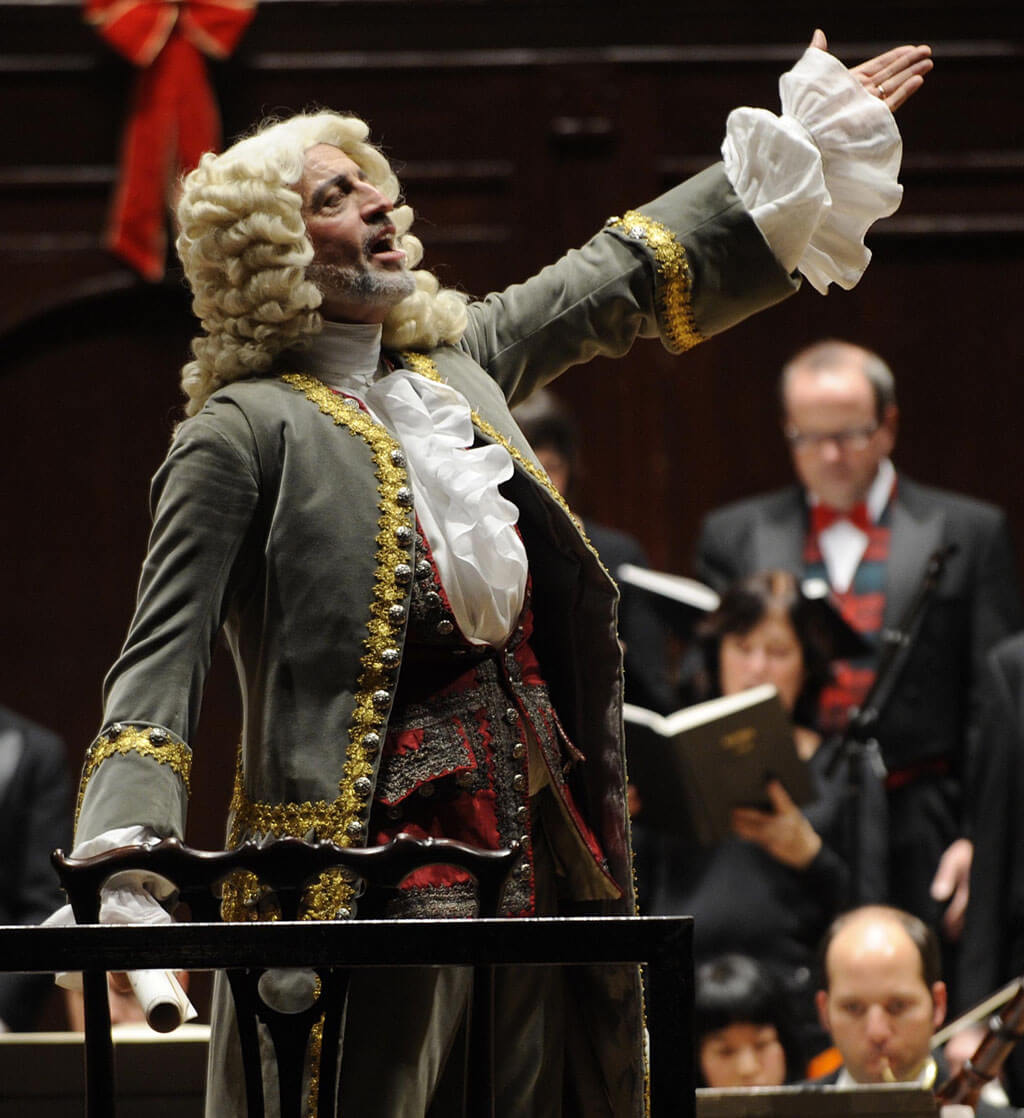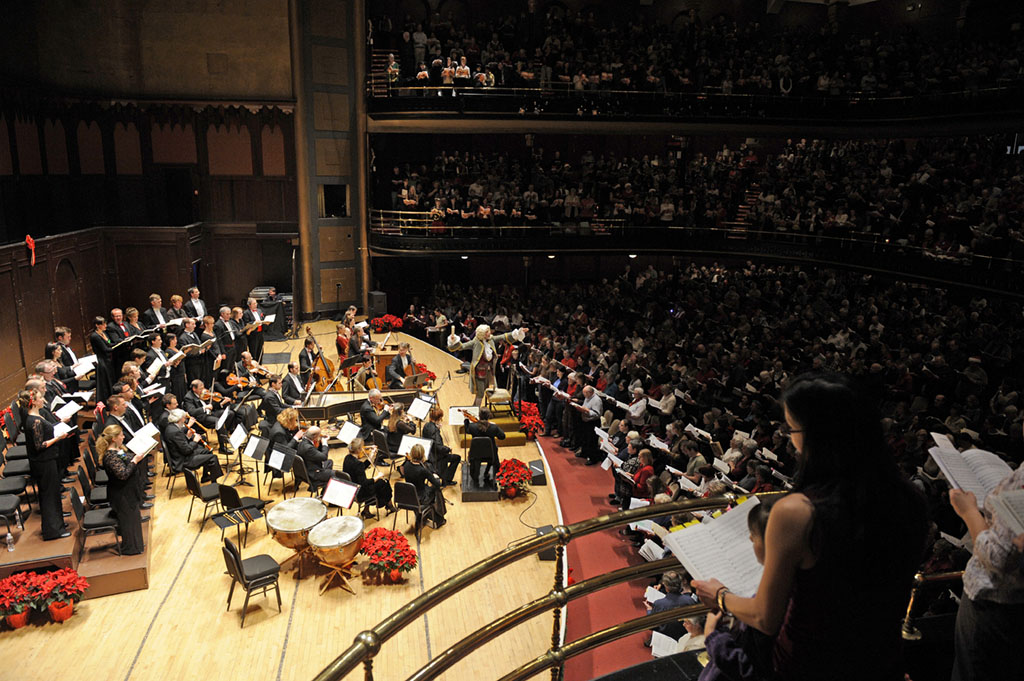
Sing-Along Messiah: Tafelmusik Baroque Orchestra and Chamber Choir, with Ivars Taurens at Massey Hall. Dec. 17, 2017.
There was a peculiar sight in front of Massey Hall on December 17. Rather than a mass of frantic Christmas shoppers rushing back from the Eaton Centre, there was a mob of people with Messiah scores tucked underneath their arms. They were arriving early to grab their seat, chat with old friends, and look over their scores before Tafelmusik’s Sing-Along Messiah began. This scene has occurred once a year for past 31 years; After Tafelmusik’s concert run of the Messiah, the small baroque orchestra with period instruments, the four soloists, and the tastefully small choir of 21 are joined by an eager mass of loyal amateur choristers. Some might laugh at the saturation of Christmas sweaters, but for this chorister for a day, and the many others in attendance, it was the highlight of the holiday season.
Bringing Handel Back from the Dead
As if Adele had walked out, the entire audience began cheering, yelling, and standing up to welcome the conductor, George Frideric Handel himself! Nominated in 2011 for a Gemini Award for his performance, Ivars Taurins perfectly embodied how I would have imagined Handel. Every aspect of his performance was carefully deliberated from his costume, including a cane and a limp, to his pervasive German accent. However, what made Taurins’ performance remarkable was its wit and humour. Taurins left the audience in stitches with jokes about Handel’s jealousy of Bach, and he even taught some history about the Messiah in an engaging and novel way. Although it might sound like you need a music degree to appreciate this humour, based on the children also laughing in the audience it was accessible for all ages. Some gags didn’t even reference music like when a Stormtrooper brings Taurins his wine, and he remarks, “it’s very hard to get good help these days.” It was moments like these that the cult and spoof-like nature of the performance reminded me of going to Rocky Horror Picture Show on Halloween.
To accommodate for the comic interludes, Tafelmusik presented a shortened version of the Messiah including the most popular choruses (omitting some of the harder ones such as my personal favourite “He Shall Purify”) and solos. Although one might argue that these interludes distracted from the performance, I can assure you that if anything it only immersed the audience even more. During the solos, there was complete silence, and many of the spectators took this opportunity to follow along with their scores.

Historical Authenticity of Efficacy?
Joanne Lunn gave a riveting performance as the soprano soloist. She uniquely shaped the coloratura in each line of “Rejoice greatly, O daughter of Zion” at a speed that left me in awe, and contrasted this with breathtaking sensitivity in “I know that my redeemer liveth.” This was my first time seeing only one female soloist in the Messiah because the parts usually performed by a mezzo-soprano in the 21st-century were instead performed by the countertenor, Daniel Cabena. Normally a great supporter of “reviving” Baroque performance practices, this choice puzzled me. I would have accepted the lack of female representation on stage, if Cabena’s countertenor voice could be heard in Massey Hall over the orchestra. Although it might have been easier to hear Cabena in Koerner Hall (where the non-singalong performance was held), I found his light instrument struggled to portray the dramatic contrasts of such important moments as “He was despised.” Tenor Rufus Müller provided a very engaged interpretation of Handel’s music, though at times he was overindulgent with his high notes in the recitative. Similarly, Brett Polegato gave a show-stopping cadenza at the end of the baritone solo “The Trumpet Shall Sound” that sounded too romantic for Handel oratorio. However, as Polegato smiled with victory at the end of his air, the audience laughed in delight at his accomplishment (Something one can only do at the Sing-Along). Conducting on a chair with a piece of what seemed to be a rolled-up manuscript, Taurins led the ensemble with assurance. When he turned around to conduct the audience, still in character, he pointed out when the chorus made mistakes only adding to the novelty of the experience.
The Sing-along Finds a New Home
After intermission, Taurins gave a very informative history of the Messiah’s performance in Toronto. Unbeknownst to this writer, the Messiah was the first work performed in Massy Hall with 570 people! Unfortunately, he also noted that for the first time the Sing-Along would have to find a new home. However, on the bright side, this is because Massy Hall will begin the process of restoring the hall next year. Apparently, Massy Hall used to have stain glass windows illustrating famous composers.These windows included portraits of individuals such as Handel, but Bach and Beethoven were “unfortunately” lost, as Taurins humorously pointed out.
Although the Sing-Along will be hosted in a less historic location next year in Roy Thomson Hall, I for one hope that like the singers who came for their 30th time, Tafelmusik will be a part of my annual holiday tradition for years to come.
#LUDWIGVAN
Want more updates on Toronto-centric classical music news and reviews before anyone else finds out? Follow us on Facebook or Twitter for all the latest.
![]()



